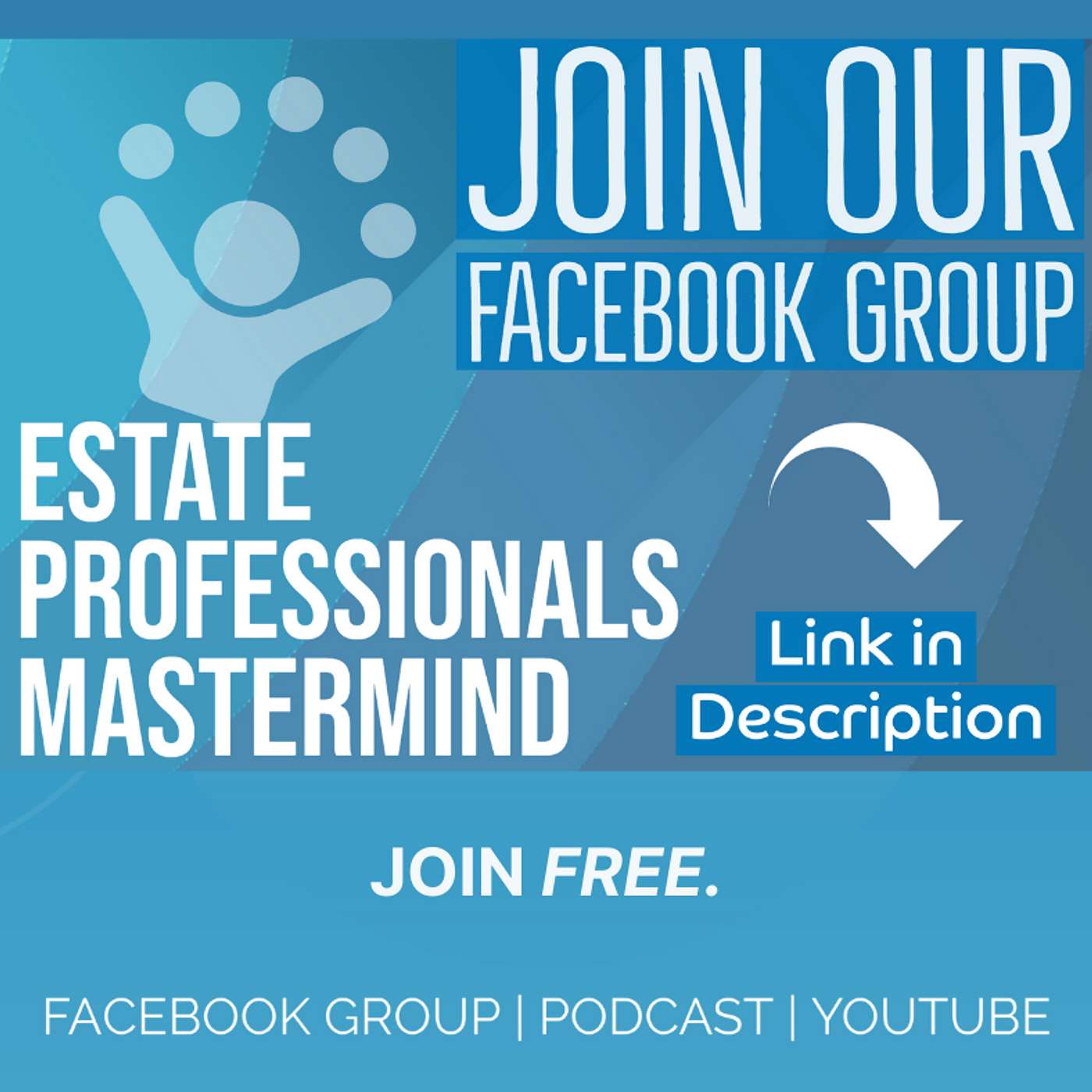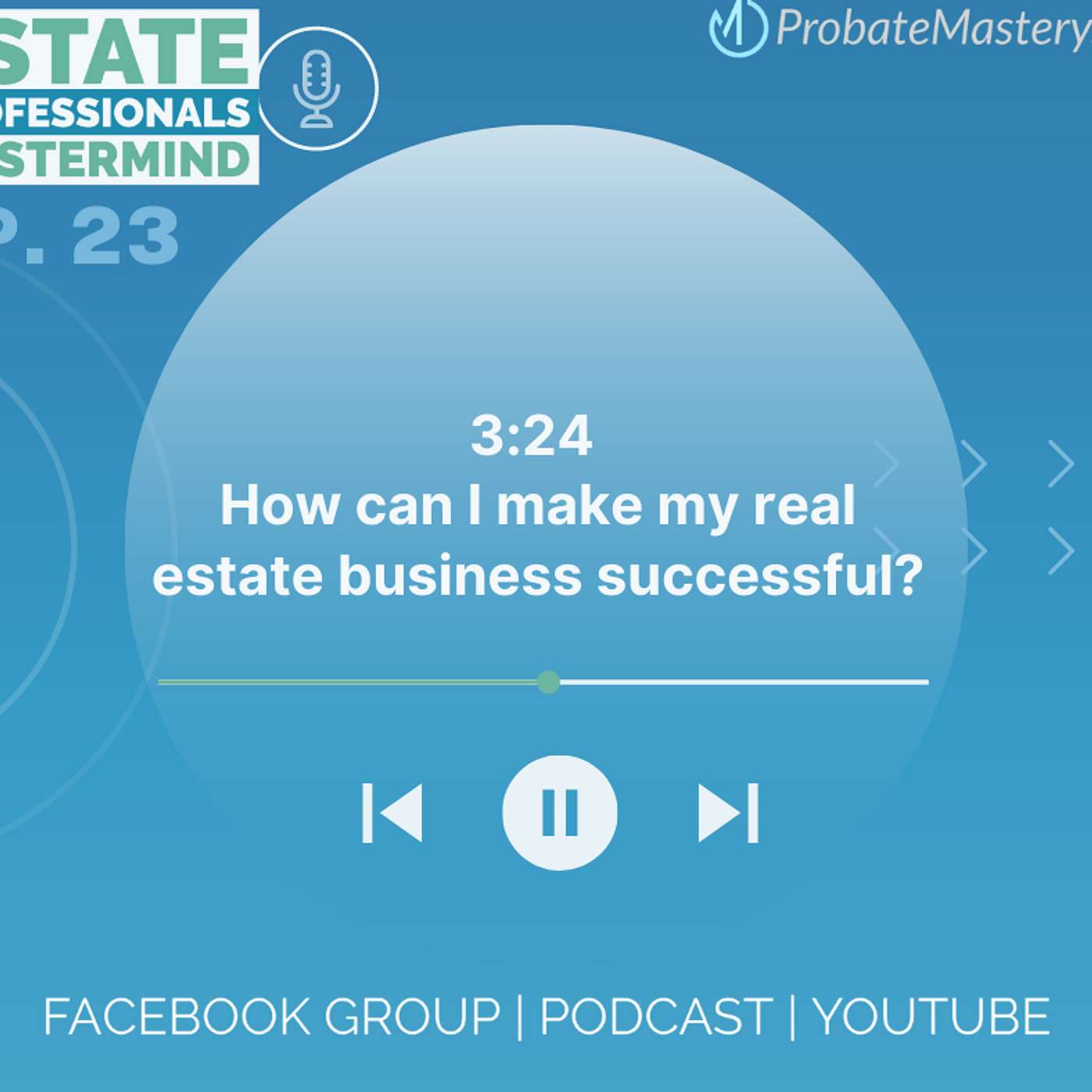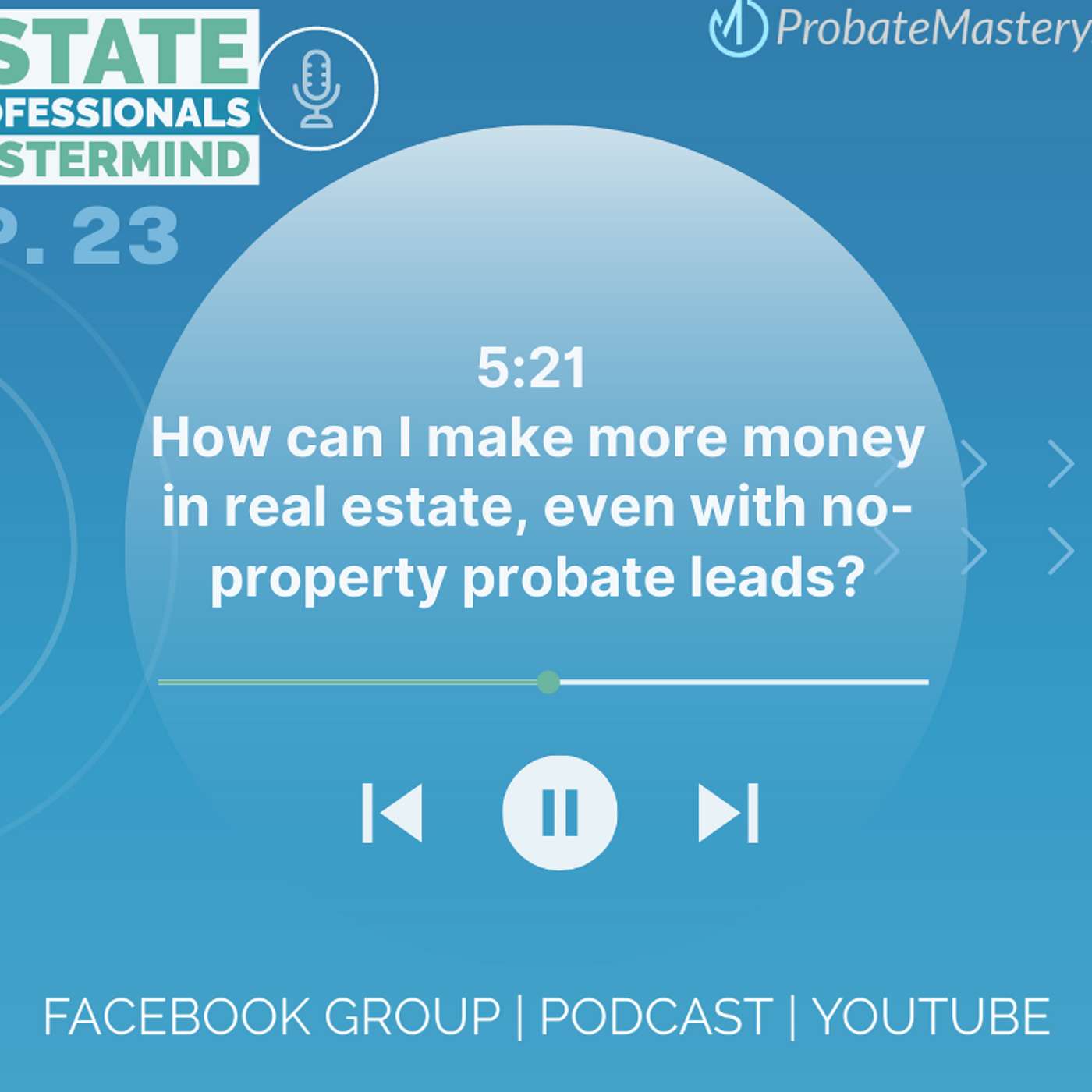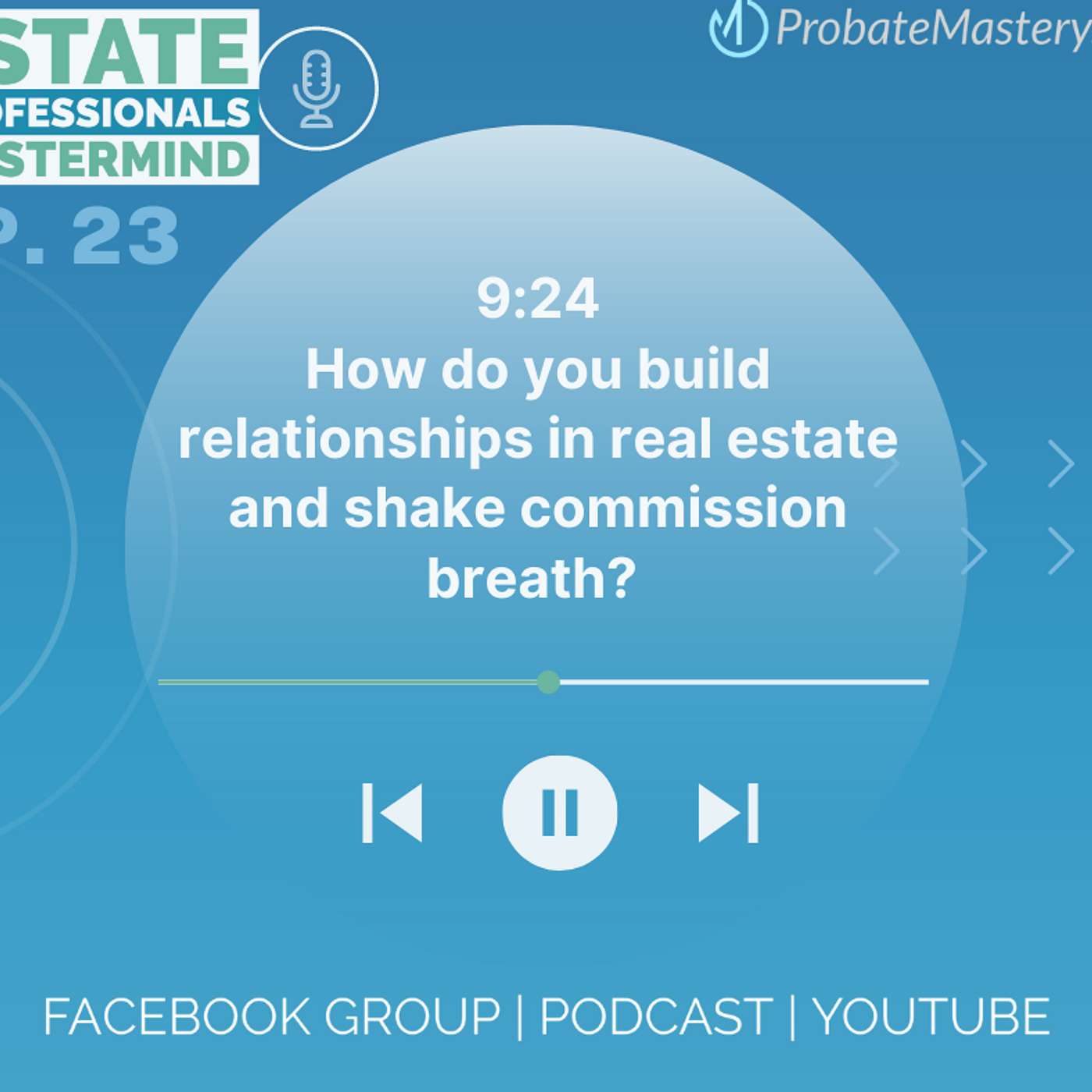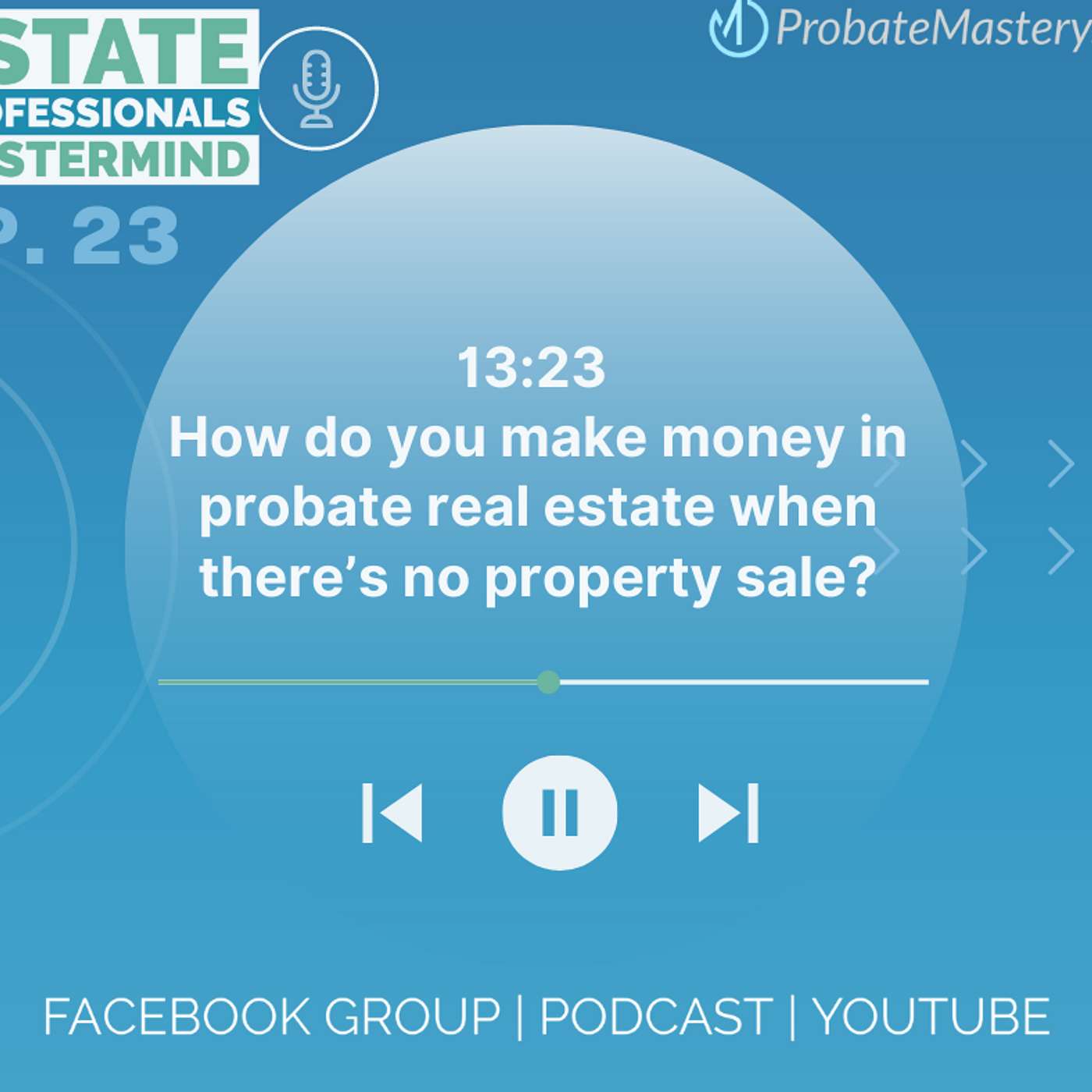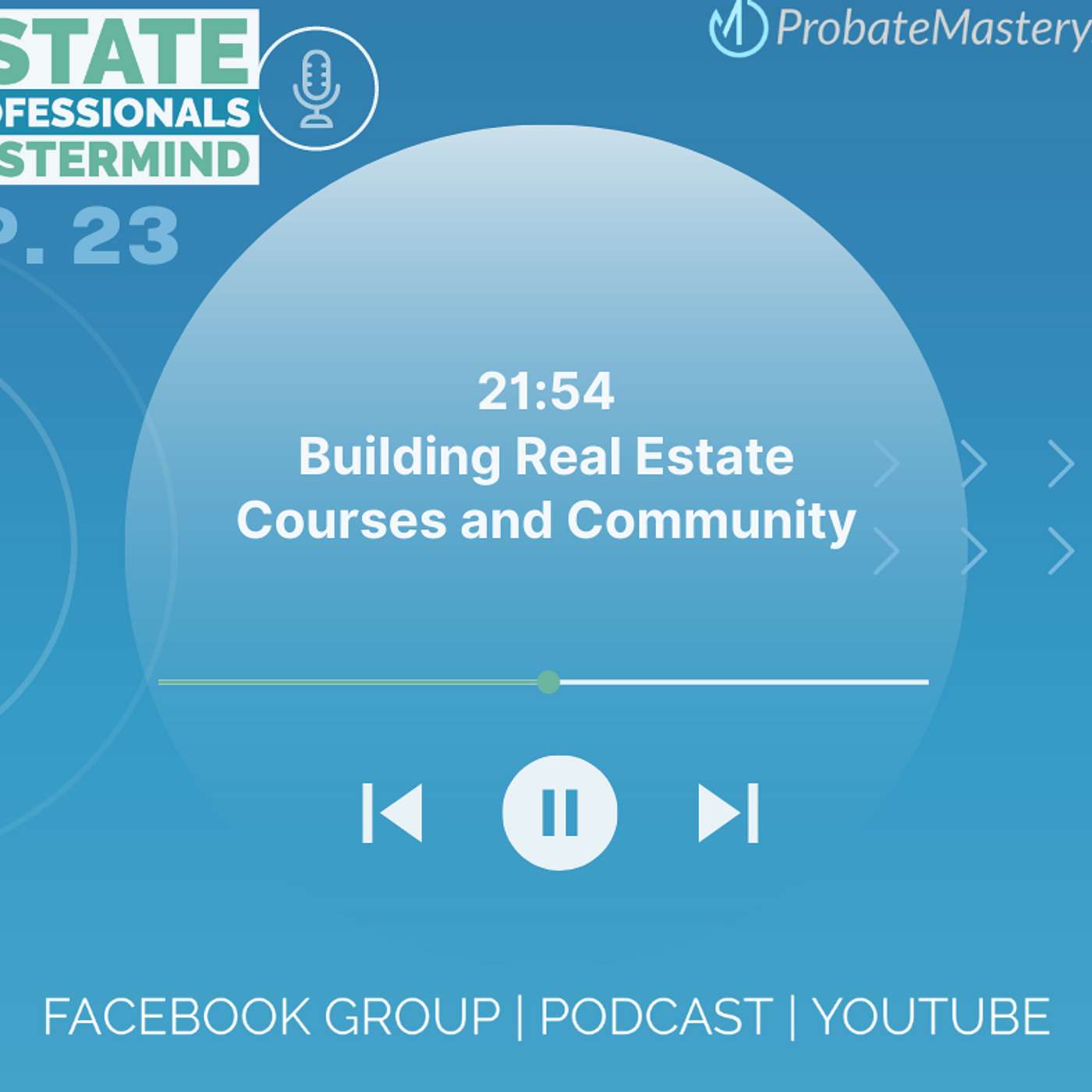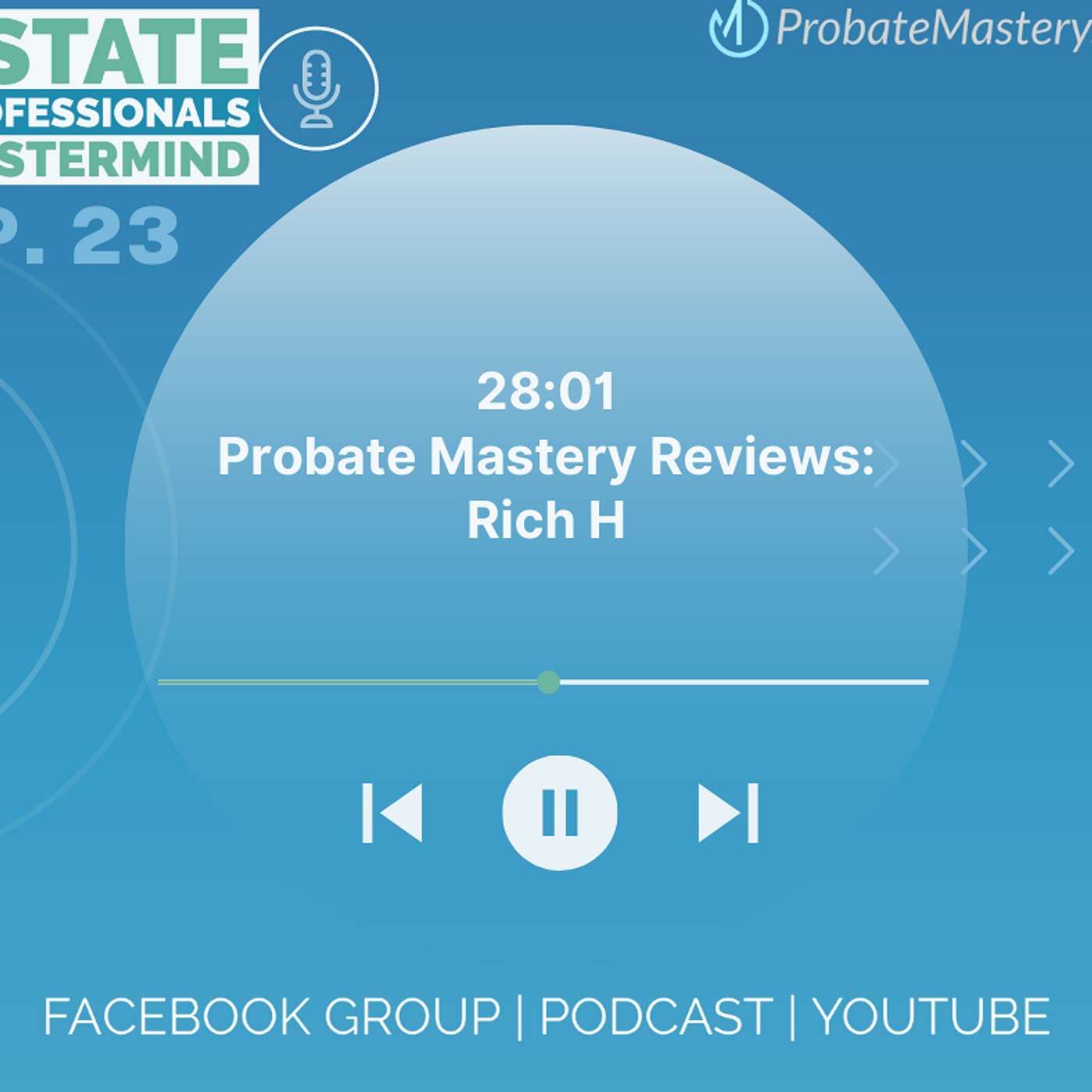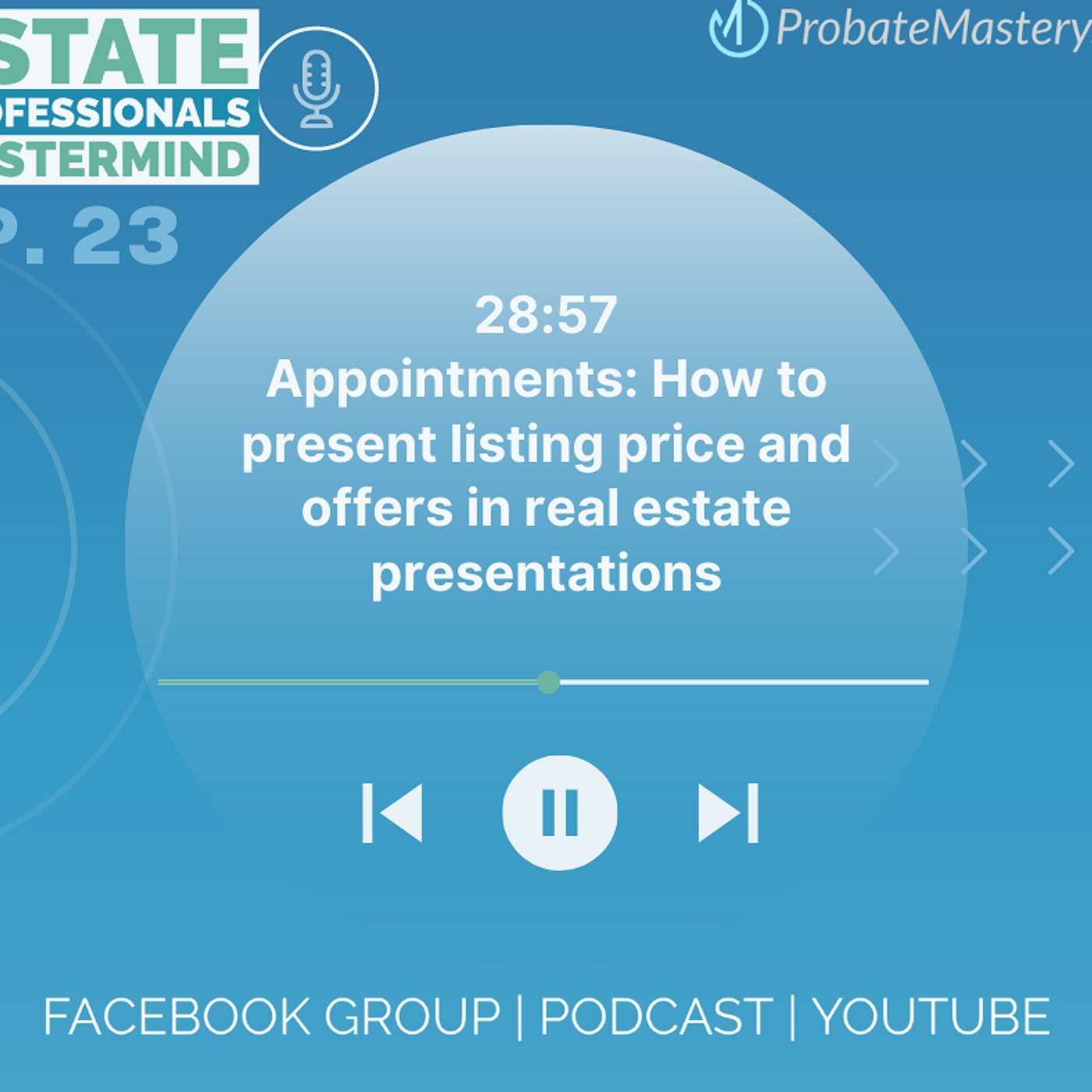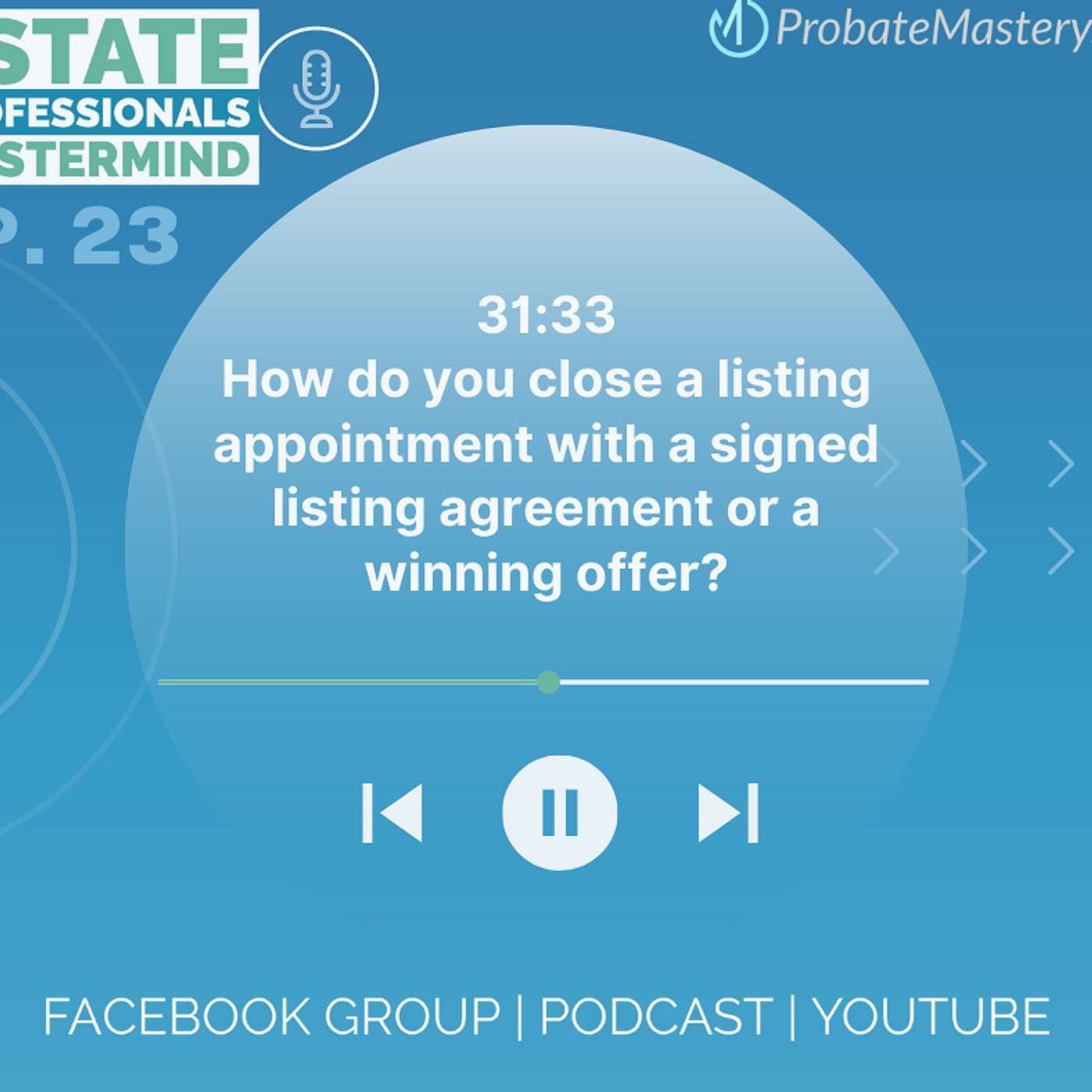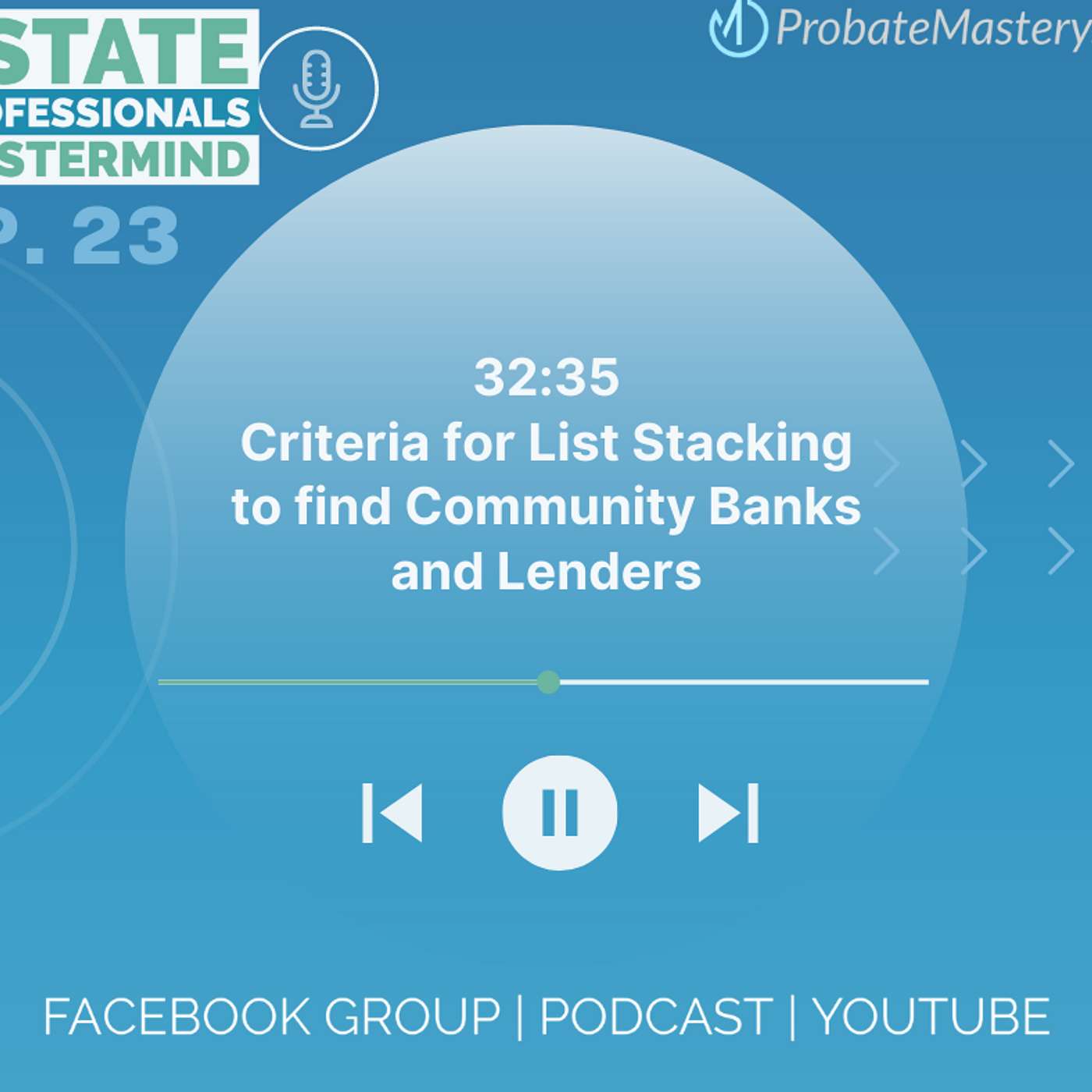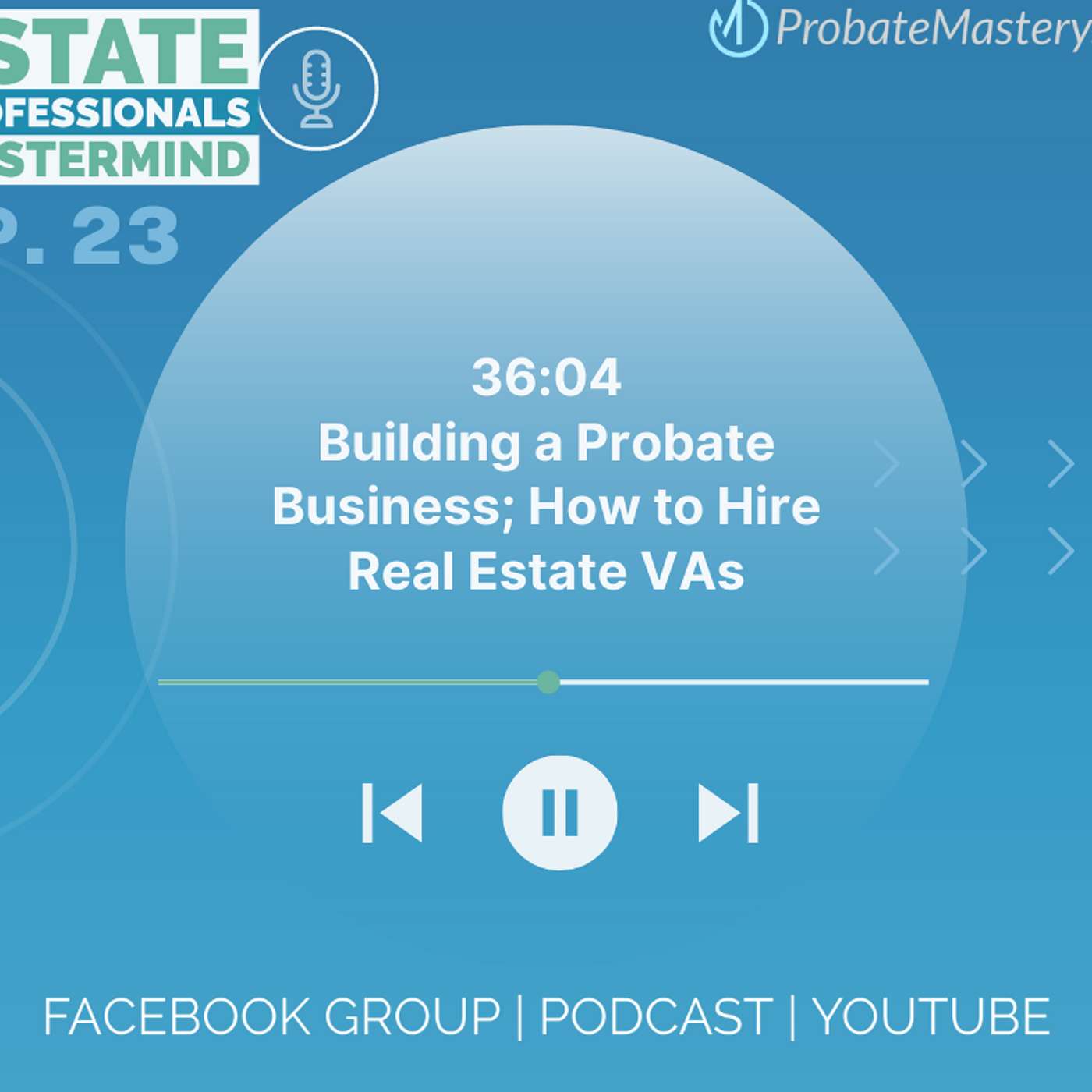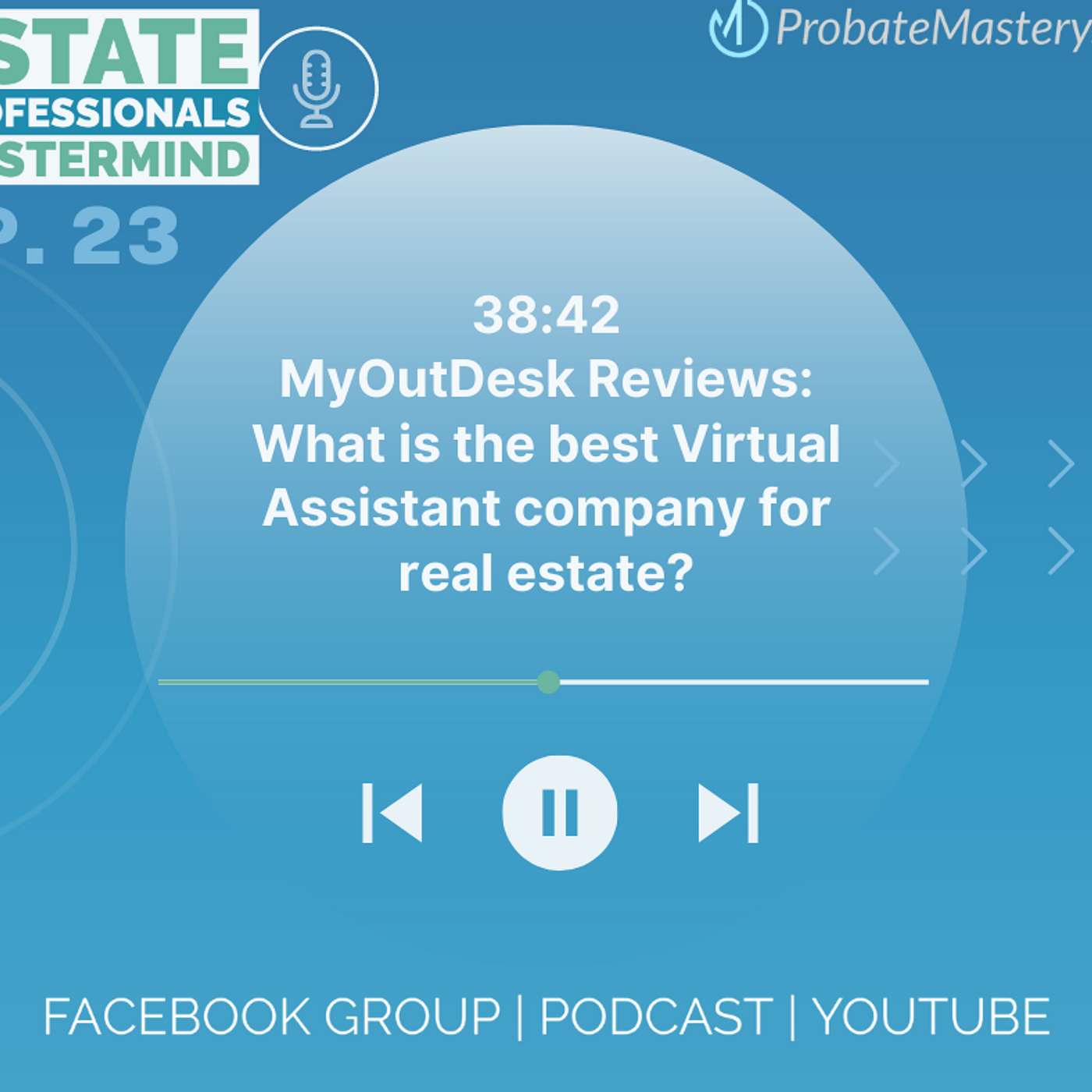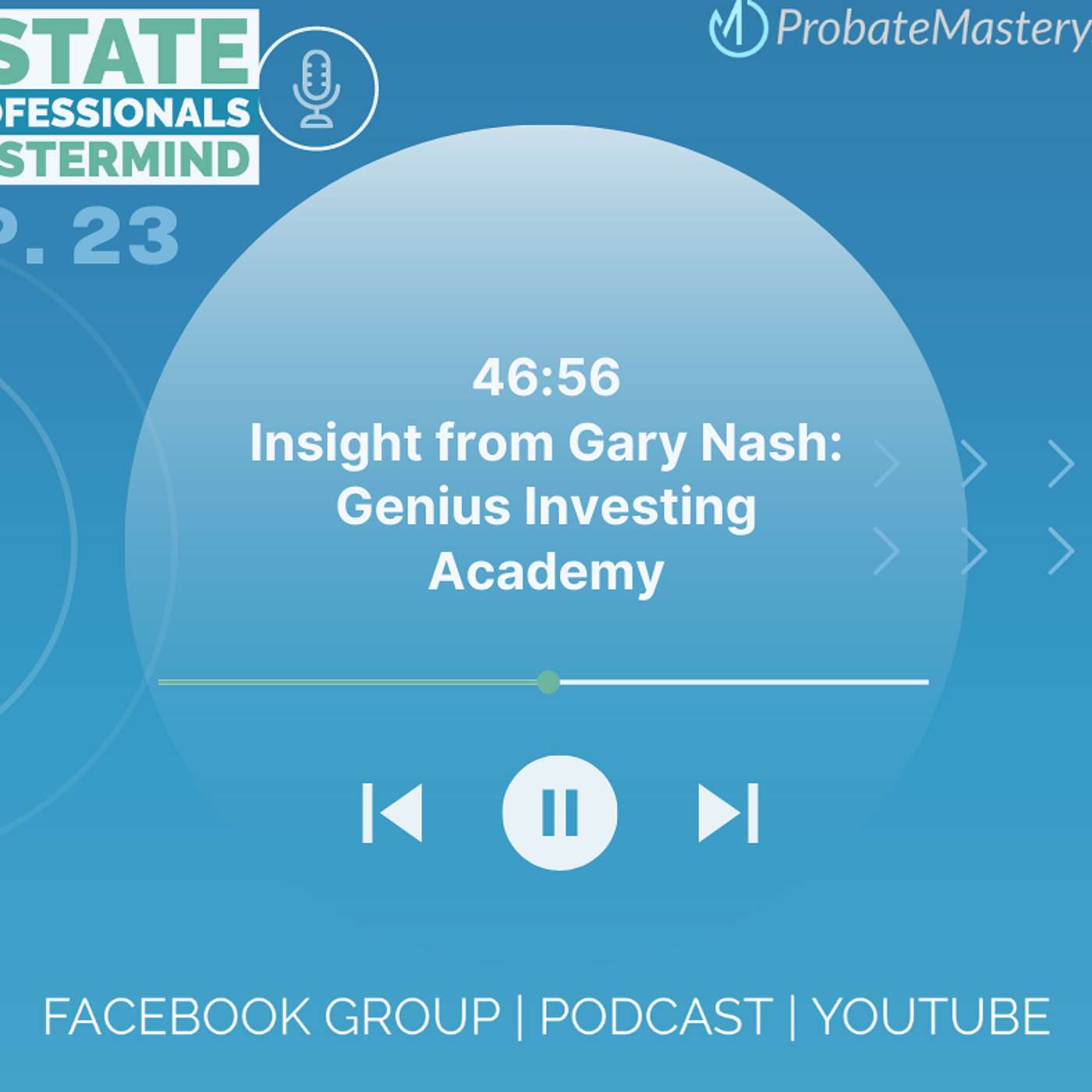
Estate Professionals Mastermind - Probate and Senior Real Estate Podcast
Estate Professionals Mastermind is a community of real estate agents, real estate investors, attorneys, fiduciaries, and financial planners aiming to grow their income and achieve financial freedom, all while making an impact in their community. Join our facebook group at https://facebook.com/groups/estateprofessionalsmastermind Bruce Hill, Bill Gross, and guest coaches host weekly group coaching calls with alumni of the Probate Mastery Certification course (ProbateMastery.com), where participants take a deep dive into personal growth and accountability, deal analysis and transaction engineering, and action plans for taking their success a step further each week. Live participation in group coaching and access to a 24/7 alumni group is free with Probate Mastery enrollment.
Estate Professionals Mastermind - Probate and Senior Real Estate Podcast
Using debt and equity financing to buy Probate Properties PLUS How to make more money in real estate
Live probate training episode #23: Building trust and relationships in real estate with the Probate Mastery course methodology; Owner Finance, private money lending, double closes, and other ways to structure probate deals.
Full probate podcast notes and links to additional real estate resources: https://probatemastery.com/how-to-make-more-money-in-real-estate-probate-training
Watch with video on YouTube: https://youtu.be/BzU7RdAQXGg
MUST JOIN! The Estate Professionals Mastermind Group has productivity challenges and probate training, high-energy community support and networking, and is FREE to join. Join Now
Time Stamps (YouTube links):
0:00 How do you make money your first year in probate real estate?
3:24 How can I make my real estate business successful?
5:21 How can I make more money in real estate, even with no-property probate leads?
8:02 How do I make my real estate company stand out?
9:24 How do you build relationships in real estate and shake commission breath?
13:23 How do you make money in probate real estate when there’s no property sale?
15:58 Using debt and equity financing to help an heir buy a probate property when refinancing isn’t an option: Private Money and Double Closing
21:54 Building Real Estate Courses and Community
28:01 Probate Mastery Reviews: Rich
28:57 Appointments: How to present listing price and offers in real estate presentations
31:33 How do you close a listing appointment with a signed listing agreement or a winning offer?
32:25 Criteria for List Stacking to find Community Banks and Lenders
36:04 Building a Probate Business; How to Hire Real Estate VAs
38:42 MyOutDesk Reviews: What is the best Virtual Assistant company for real estate?
46:56 Insight from Gary Nash: Creative Finance with Genius Investing Academy
More Resources For You:
Facebook Community
Probate Mastery Certification Course
Chad's New YouTube Channel
More Recent Content:
Learn more at www.probatemastery.com
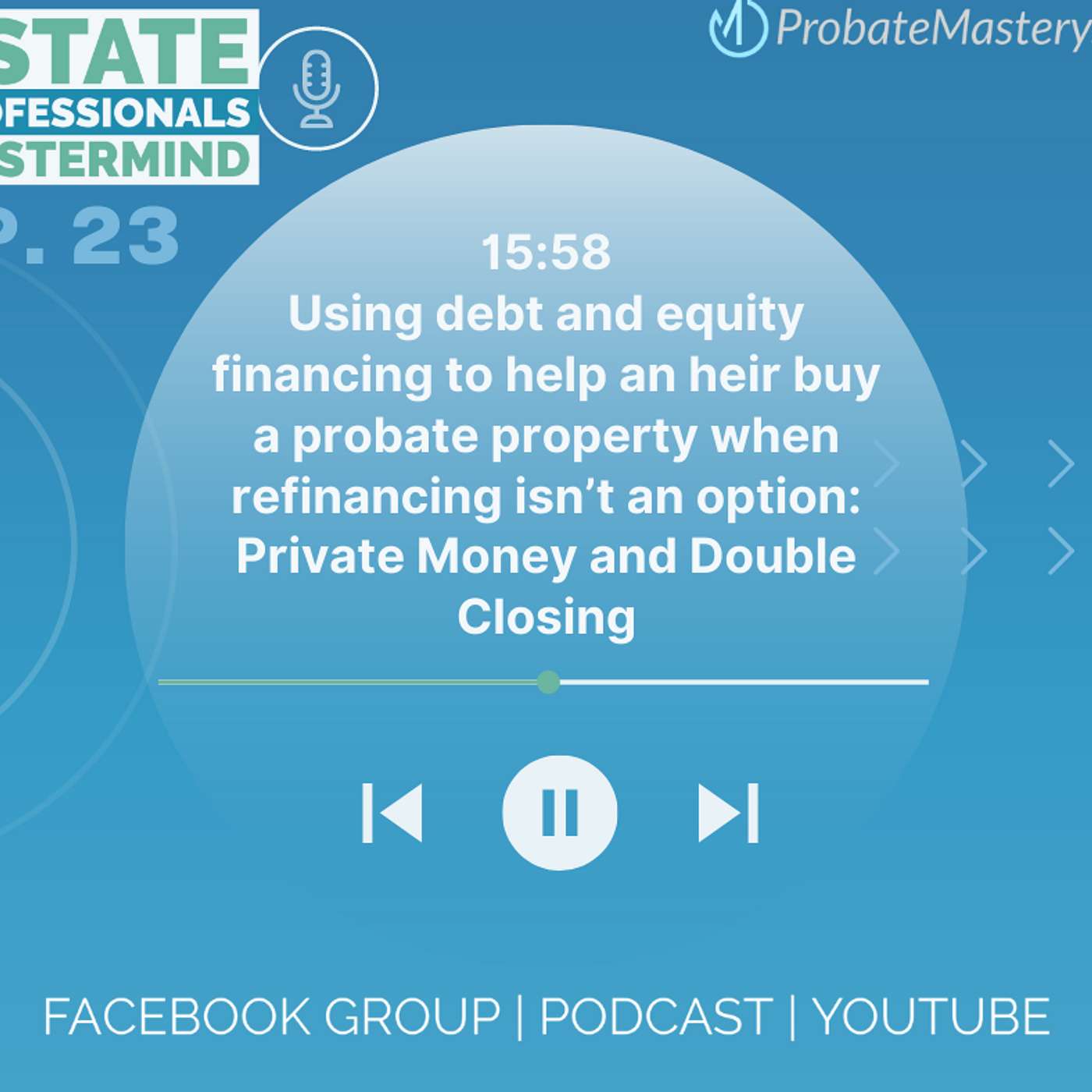
Welcome everybody to the weekly probate mastery group coaching call. Last week we started with the topic up on that stood out was a conversation that happened. And one of our groups estate professionals mastermind, which is not, the exclusive group that you guys are in as certified probate experts, but a more public group. But the discussion was a couple of things. I've taken company X's probate course. Do I need probate mastery? And the other is, Hey, I just got back from this seminar where this coach was teaching this certain methodology. Should I sign up for that or should I commit to Chad's methodology and the probate mastery way. So I really want to talk about why I teach what I teach and what my path was here. And in a context not constrained just to probate, but every aspect of your business. Obviously we're all here because at least one pillar in our businesses is based on probate. David Pannell's not here yet today but he pretty much runs his entire seven figure business off of one strategy because it was so rewarding required. So little work and allowed him to make such an impact in his community. But other people were doing FSBOs, expireds, door knocking, you name it. Like you build one pillar at a time and we're all in different stages of our business. But back to the beginning of my story and where this empathetic kind of altruistic entrepreneurship approach came from was I tried everything else. So there's a lot of coaches in the industry. I respect from Kevin Ward to Mike Ferry to Verl Workman, to Bob Corcoran. There's all kinds of amazing coaches and they all have a little bit of a different methodology. What I couldn't find I want to ultimately create. It was that kind of altruistic approach to all of this. So the main thread in a lot of coaching and training, if it's coming from your broker or coming from a third party or wherever it is, it's based around production around GCI, around, you, and they're very selfish metrics and we know a business is nothing more than a problem solver and the more problems you can solve for other people, the bigger your business will become, the bigger your revenue becomes, and the easier it becomes. And that was a realization I had. So for me, I quit thinking about my damn self and then everything became fun and easy because it was very focused. It was a consumer focused. And I have a problem with our industry as a whole being very professional centric. When it should be very consumer centric. We should have that consumer on what impact we want to have on them at the very center of everything we do. With probate mastery, with everything I've pretty much taught since I had this realization and everything I will teach in the future and what you can learn here and taking the other parts of your business if you are working other strategies, That empathetic mindset of provide value. First, before you ask for anything, do something like become valuable to them, make it a relationship that they actually want to have. They don't feel like they're being sold something. And I didn't find that coach. I didn't find that training program. I didn't find that course. I set a rule for myself. And this happened back in 2012, which was the first year that I was doing brokerage and investment in the residential space. I came up in resort development and after, two or three months worth of falling on my face and, going "I buy houses, cash Or I can list that thing and sell it. I had two offers, two solutions and I challenged myself after getting off a frustrating day of phone calls. One day, I said, Nope, sorry, I can't help you. You should do this. You should try. And I challenged myself. I'm like, it's not their fault. It's not the asset's fault. Not, it's not the house. It's you, Chad like you came up short, you ran out of fricking skillset and you didn't have a way to help them. So I challenged myself personally, how can I help others more than myself and monetize it every damn time and never have to say, I can't help you. I'm not your guy. Anything. Now I can't do everything. But what I can do, if I'm not an expert in something, can I go create an authentic relationship with someone who is then the rapport and trust that this prospect has with me will extend to them. And that becomes a solution you're damn right. And that's what we teach in building your vendor team. So you can't do it all. And that's the point in earning more, working less, and doing good. You should be doing less and you should be earning more. If you. Identify with this thinking, take it outside of probate, take it into all parts of your business. Because when you put the consumer's needs first, you focus on a relationship before a damn deal and you actually listen. They will tell you exactly what your service roadmap needs to be. It's literally like having them whiteboard and say, if you want me to fall in love with you, say this about my kids and say this about my cat, like just in general conversation, learning who they are, what matters to them, what makes them tick? What scares the shit out of them. The dominant driver of your behavior is fear. So if we can learn to expose what those fears are, then we can put them at ease. We can help them feel more comfortable than I've ever felt. And yeah, we're real estate professionals, not psychologist, but instead of how can I get this damn deal, if you focus on how can I give this person, that person, the highest level of service. And either monetize it directly or indirectly. And that's the other thing. That's really a common thread in everything I teach. If you can't get your name on a purchase on a contract and directly create revenue, it doesn't mean you can't monetize the phone call that you're sitting on right now. You get them to a registered investment. To talk about what do you do with the life insurance check when it shows up? Get them to a CPA to talk about what does it mean filing the last tax return for the estate. And when those guys see a steady stream of referrals coming in, people who are well-educated and trust you, they're going to pay attention to this professional because they're going to be extending that trust. They gave you to that person because you vetted them, but they're going to give you referrals. You're going to get a registered investment advisor is going to call and say, man, one of my, one of my top clients just died. He had a living trust. His kids are just lost. They just need someone to talk to. They don't know what to do with the house. They all have their own lives. I'm helping them navigate the portfolio and the insurance. Can you help them navigate the real estate? You will get that phone call and it's again, it's putting Goodwill forward. It's doing what's right for the consumer doing what's right for your vendors and what I've found and why I teach this so passionately the less of a shit I gave about myself. And the more I cared for all those around me, all other stakeholders, I don't care if it's a damn title company, I treated them like they were my best clients and that created this influx of business. And like that Goodwill out seems to come back in multiples for me. So there's merit to what all of these coaches teach to all of these programs, these books, these courses. What's so unique about this community and you guys live this it's like you guys are helping each other. One of the coolest things in the world about this is when you guys jump in on Facebook and start coaching and supporting each other. And I know you're in other groups and I know you've seen the poison pen where everybody just attacks as soon as somebody posts something. And I'm so proud that's not our culture here. I'm so proud that our students coach our students and that, that's the best currency I've ever had in business. I'm sure there's probably more of a discussion here. If you're not already like don't isolate what we talk about here just to probate. You can take it out. It works amazingly well in divorce, in guardianship. And, we had a quick conversation. I showed you guys how I deal with pre-foreclosure and foreclosure, but take that empathetic value first approach toward every conversation in real estate. And man, the cashflow rollercoaster just flattens out that actually turns into just a constant uphill and everything smooths out. And it just, it's a hell of a lot more fun and a lot easier. Nina love to hear your commentary on this. I think you were you're one of the inspirations for the beginning of this call. So I'll jump off my soap box now. And, uh, Sure. Yeah. I completely agree with what you're saying. I've experienced it firsthand. I had a I sold a property. I'm a realtor and probate specialist and I sold a property in 2019 of a friend of mine. Most of my business comes from friends. And other investors. She had me sell her duplex in an opportunity zone. And then as we were finalizing escrow, she said, oh, by the way, my family is in probate. And they have like my, the woman who passed, she had nine properties and I was like, okay, I'll deal with it. And I had to dust off my specialist designation, cause I hadn't done probate in a while. It took over a year and a half to deal with that probate because by the time I got the referral, the personal representative wasn't ready to sell for a year, he then passed away. So they had to get new ones. I said, get co administrators because, cause they were all older. I said, in case somebody else dies, you'll already have somebody else who can take the reigns. With COVID happening. It delayed the courts, LA county courts. I'm in Los Angeles. I worked with Bill Gross at exp and and the courts are just taking six months, which is normally up to 83 days, average to get letters. And I actually sold, they ended up getting two and then the heirs decided they wanted to split all of the properties up amongst three different agents that they all had relationships with. So I only ended up selling two, which is fine, but I did the thing of it is that I stayed with them for 18 months in communication followup, providing resources, giving answers, they had a really poor attorney. Who was an estate attorney and he does mean all attorneys. Aren't excellent at their job. And, this is the reality is that we have a lot of estate attorneys in California, just because of the nature of the value of, we have a lot of high earners, high asset individuals. So there's a lot of estate attorneys, and yet the majority, there's a good majority of them. They aren't about the relationship. They're about getting the trust. They're about writing that trust contract for $10,000. but they don't necessarily have a lot of experience in the probate space of transactions. And this particular attorney was not very good. He actually, I saved the money. By waiving an additional probate referee appraisal that they didn't need a second time. But bottom line, I stayed with them and since then I've formed a deep friendship with both of them and made new connections through them. And so it's true that the relationships are paramount and I don't bad mouth any of the coaches out there I've spent tens of thousands of dollars on coaches, both real estate sales, as well as investing. It's just that there's a certain approach that they take. And one thing I found when working with investors and coaches, as well as my investor clients, the focus is heavily on the relationship paramount. And ultimately whenever I Teeter and I'm focused on, okay, I got to get that commission. I got to get that close. I got to move this transaction forward and get, bring that built those dollars in it's about me. And I lose the heartfelt connection and that, that energy alone, even if I don't say anything, it's just the energy of that is felt. That was known as commission breath, and everybody can smell commission breath. And as I've matured and gotten older and studied more philosophy and spirituality, and I found in Daoism thousands and thousands of years ago, and the Dao de Jing. Basically the harder you try to control something and get something the further away from you you're pushing that. And voices of that in almost every world religion will tell you that. If that is your focus, you're just getting further away from it. Yeah. It's a hard lesson to learn though, especially when you do lack in income, when you lack, when you're in financial lack, it's hard to come to lead with an abundance mindset when you're in a lack mindset. And that's where it comes in. Like you gotta do the work guys. Like you've got to, you've got to say, what kind of man am I in 10 years, I'm fed, it's good to see you here today. I challenge you with this a couple of months ago, but I asked you who the hell are you in 10 years? And when you get clear on that, like the way people look at you, you can get it that you can get down to the things you own, the car you drive like that. Like it's really not having that lack mindset, having an abundance and service mindset. And it'll come through in everything you do. And I can just quickly add to that, that I too have done a lot of spiritual practice and development. And one of the things I've learned. Is that when you're coming from that commission breath or from that wholesale breath, whatever we want to call it it does limp. It doesn't immediately. It's just putting the energy out there of the lack, like you said, the way to shift that is to have the faith that it's going to work out and something's going to come to you naturally, if you trust it. And the access to that, that I found that works is to be in a space of appreciation simply because appreciation puts you in the present moment. And if you appreciate the people in your life, the things you do have sure. And the material things, but the experiences, your life experience travel, whatever it is. If you focus on appreciation, you're appreciating the creativity of a transaction, the challenge, it puts you into a space of being open to receptivity, not experiencing lack and being in a space of abundance. So just wanting to make that point, but I have a question you mentioned monetizing. And I had I've helped several clients who I haven't done anything with, I literally just help them. And this particular one, she was in a trust, but she filed a a suit against her brother who was the co-trustee, which forced it to be put into probate court because probate court then becomes the mediator in that situation. I don't know if you know this, but it wasn't that there was anything outside of the trust that caused him to go to probate. It was that they were now fighting as to who would be the trustee. And so it had to be mediated through public probate court. I knew immediately the solution to do a transaction where she wanted to keep the house. And I said, we could do a transaction where you buy his shares. So you just write it for the value purchase price, and then she gets a credit for her value, and then it's sold to her or he gets the credit for her value. And then it sold to her. So bottom line, I explained this to her, but she'd been through two attorneys and was now ready to go to another civil lit attorney to deal with it. And I referred her to three different attorneys, two of which do civil lit specific to a state issues. And there was no, no way of monetizing that situation for me that I could see. So when you say, find a way to monetize it, how can I monetize it? Where it's a situation like that, where I'm referring them out to someone that really, attorneys, aren't going to pay a referral fee on that. So curious I could think was to do the buyout sale, but she didn't in my personal life, I'm actually coaching someone through a very similar situation right now. So there's a couple of ways you could have monitor. You can still monetize this a lot of times what you'll find out is the heir, who wants to retain the real property. They don't actually qualify for financing and they don't have the cash. And there's not enough cash in the inheritance to cover the equity spread for the other half they're trying to buy. So a lot of times the property will end up being sold. Anyway, even though it's against at least half of the heirs wishes. And that's not the outcome that I'm willing to accept because she told you, she told what I know about her. She said, I want this house. I want to keep this. This is part of my family's legacy. So for me, I'm like, ha a challenge, right? So how the hell do I get that person? Can I get them? Why? So first I'm going to ask have you talked to a lender? Are you qualified to purchase the home? If the answer is no. Then my next question is a lineup let's get specific. Is it that the income ratio, is it the number of property you already own? Is it because your income has declined? It's because you're self-employed and once we know why the underwriter has a problem with her and she can't get approved for the mortgage, then we start to see possible solutions. One could be a portfolio loan through a community bank, two, it's going to be a private investor loan. You're an investor I'm betting, a hell of a lot of investors. And I bet right. And this economy, a lot of guys that are flushed with cash that are priced out of deals in their own market, because who the hell is going to pay a three and a half cap and your market like there's guys that are normally commercial real estate investors that are just sitting. I looked at a cap rate table just before I got on this call. And it is unreal. Like guys are priced out of their own deals cause foreign money because of inflation foreign money is rushing in the U S commercial real estate. So it's no big. Carve off two or three, four or 500,000 bucks for a private mortgage with a first position. He's not afraid of that. That's a smaller risk than he would be taking if the cap rates weren't so compressed. So first off, try to get her a conventional loan or try to get her a loan with a more conventional rate. I would recommend stay away from conventional for this, try to get like a community bank portfolio loan, our regional bank portfolio. The other thing you can do is appoint a third party to purchase the house like your investor. If they're not comfortable with lending to her, sell the house. And then have him owner it straight back to her and do a simultaneous close with one set of recording feeds and just do an a to B to C owner finance deal. And it clears title the way through, she'll get a general warranty, she'll get a general warranty deed and a note first need of trust. And she gets exactly what she wants. And you can close that up and the hell seven days with the right attorney. So you can get paid a commission on that because there's a transfer or you can get a finder's fee, a marketing fee, whatever it might be a finance fee from a private lender. If they're not the purchaser or with the bank, you're just building good. And you go to a community, the commercial division of a community bank and said they do asset based lending, not borrower based funding and say, Hey man, I've got a client that this house, I need a 50 LTV, basically bridge loan until she can get control of the asset. And then we'll refinance it through the residential mortgage division of your bank. So you create mezzanine financing through a commercial lender relationship. Now that, that commercial lender, who's he going to think of when his investor is saying, Tom, I can't, I was going to build another dollar general, but who the hell is? I can't afford these construction prices and who the hell is paying, a three cap for vacant land and Los Angeles county. What do you think I should buy well, or I'm going to go buy a single family rentals. Cause that seems to be where that, where the returns are. All my gosh, you have got to meet Nina. She knows her stuff. She had a client in here last week and she actually told me how I was going to create mezzanine financing and then get the refinance. So we made not one but two sets of feet and he'll sell you. So there's since 2012 and maybe I'll eat Crow on this one day, but I haven't found a situation where I couldn't do what the meet the consumers needs and find a way to directly or indirectly monetize it. But you still have at least three options on the table. Yeah. The mezzanine financing I'd need a little bit more because I know that she was working as a waitress. So I don't even know if she would, when you say that, that tells me because I also do commercial and that tells me you're talking about doing a no doc loan, basically. In order to get her in, but it sounds like it'd be easier to use an investor who just has, because I got plenty of investors who were scraping for deals here because the flipping space is just saturated and they can't find anything. And the sellers are thinking, oh, it's a buyer frenzy. The prices are super high. They just can't deal with coming down $150,000 on their list price. If it's MLS, even if it's off market, just because those investors are under 50 years. And they're investing with self-directed IRAs, especially like it doesn't matter Roth and traditional, if who's using self-directed IRAs or solo cage or peace slut, those guys are great. Cause that's their long money pot. They can't touch it for another third, another 20 to 30 years, they can't touch it. So for me, interest on it on top of the list, they're paying on borrowing it out, being their own bank. Yeah. And it does not trigger you, but which means it is allowed in their qualified retirement. Yeah. So for me, like I write mortgages, I do them in taxable accounts to like out of businesses, but for the most part, when I write a private mortgage that comes out of a self-directed IRA, a solo K or a QRP, and one of those tax advantaged accounts, but I can't such hell, I'm not even 40 years old. I can't touch it for 25 years anyways. So it's what the hell? And I'll throw it out there. And an interest rate that I can live with. And if these guys are, if they've especially on their taxable accounts, and that's a big thing in California. If you go raise capital, then you can't deploy. You're done capital rating because you got to egg on your face and your reputation is no good. It's I gave him my money. He told me he paid me a 10 profit and he never bought anything. So it's either going to eat you a lot or you have to give it back and have an egg on your face. So any of those guys in California who had this big house flipping machines that have private equity on tap like a blind pool, they've got to make those preps, or they've got to embarrass themselves by handing the check back to the investor. they're looking to deploy capital, even in risky positions. And they know this world, this is what they do every day. They're not afraid of it. I do my own underwriting. I'll give you an answer in less than an hour. Like I've got the tools and I've got the relationships I can call people and then bet you and bet the asset. And if I need to, I'll take a day, but normally I make an underwriting decision in a day or less, and I wire the money. And so there's a lot of people like me that they could either buy the house. And then owner finance at to her of an a, to B to C close, or they can just be a straight line, private lender in first place. Wonderful. Yeah, I think you should teach another class on that. There's a lot of classes in my head that I needed to get out and whenever I can get this camper parked and actually focused, that's a, that's one of my goals for next year. And I'm curious your opinion. So like I've been forced, challenging myself to find a way to take all of this and turn it into one big course that won't confuse people and you can just chip away at it as you progress through your career versus a model where I create categories of courses. So today we've talked about mindset. We've talked about relationships, we've talked about transaction engineering and we've talked about finance. So is a big master class the right format or do you think a university, of course basically a Udemy where you come in, you have 50 classes to choose from and you choose based on the broad category, what you need to learn today. What do you think is the best format? Actually both and I'll tell you why. I actually took those confuse me even more. No, I'm in field. I actually, I started in higher education actually, before I went into real estate. And I tell you why people learn both ways and there's different types of learners. Some want everything somewhat, a little bit, some want to be able to design their own curriculum. I took Joe McCall's lease options, SIM slow, simple lease options. And he also came up with a land profit or a land deals, land flipping course within it that he offered some basics on that. And then he started to create a financing or he partnered with another investor who does creative financing. And these were all upsells and they're there for a reason. And I think that, with each of them, you to be a master in any space, you really need to just focus on one, do some deals, learn it and know it and then move on to the next. So I think breaking it up as appropriate and I actually helped to design a multifamily agents click funnels and his course on transitioning residential agents to commercial agents in multi-family. I helped him to design his whole click funnels and everything, and I said, Hey, you gotta break it up into three price categories. You're got your basics, your foundation, then you've got your mid-level and you've got the full blown package. So this way, and people in what you just described, Chad, people could actually pick and choose maybe in the middle level, like the foundations. Those are the core classes, right? Mindset, basics of real estate, investing wholesaling, those basics, but then the middle one could be, pick and choose additional ones. And then the third one could be just a full-blown here's everything you get. And and let it, let them take the, everything you get, where they like you have probate mastery, do the prerequisites complete this course first, then move on to the next one, because it can be a fire hose and they won't be productive if they don't go through one and apply. That's what I've been searching for a while. So I appreciate your input. It could be, you have to really figure out exactly how you'd put what together. I don't know, it's a lot to have to chew on. And the thing is, there's so much to that I really want to teach, but I don't want to do it in such a way that it's just a big fricking a la carte sale-a-palooza, I want it to be progressive and clear. So it doesn't overwhelm and fed is an amazing self educator. I don't know that you've been on a call with them yet, but I've watched him choke himself out on Chris Prefontaine, creative financing course on my probate mastery course and other things that he challenged himself with and his personal life and his professional life. And that I don't take that lightly. Like it's, I feel an obligation. Like I have the way I present these lessons are or access to me if I'm overwhelming people that I'm doing this service to everybody. I'm looking at, going into annual planning for 2022 and I really know what I can teach. I'm just trying to figure out how the hell I do that. You'll get there. I know you will, but I'll reach out to you if I need help with structuring. Oh, absolutely. And that's something else I've thought about. And I don't know if you guys would find value on it. If we set up like priority blocks on my calendar for transaction engineering emergencies, where if you're in an, even if you're in an appointment and just say, can I use your bathroom? I don't know if it can be in that real time, but maybe within the hour or so where you guys could actually in an emergency book and I'd be like, holy crap, how do you put this one together? That's something that I feel like I should do, I need to do for you guys as well. Cause it's, you sometimes end up waiting a week to make that follow-up call to hear that advice. So that's another thing I'm thinking about is actually having a real time transaction engineering resource for everybody. Yeah. Yeah. That would be ideal. Like even if it's some kind of a portal where people can just post here's the transaction. Here's all of the details of the situation. What do you recommend? I do. And how do you recommend I do it? Because that's a big piece I've learned from taking some very poor classes and very good classes from investor teachers where they would do, they would tell you, they're going to tell you how to do it. And it's mostly fluff. So yeah. Thank you. Yeah. And I get down to what you'll find with me. I don't share paperwork. like, I'll do everything, but hand youthe contracts I don't like giving out paperwork cause there's 50 states and lots of attorney opinions. But as far as everything else, how to handle the people, the logistics, how the deal will, everything that contract law I'll give everything. I know. I don't just hand paperwork. Because I've seen people get pinched and I've been cautioned not to do that. and fortunately I've never been a part of it, but I've seen some nasty litigation against people who didn't really deserve to be the defendant. Yeah. And then really is the best practice. And actually in California, as the agent, I have to use the California association realtor forms. However, if it's something unique, I can go to an attorney to draft up the contract and I always recommend that. Yeah, me too. All right. Do you pronounce your name, Nina or Ninah? Sorry. Most people do. I had an aunt nine of those, so I always ask Nina, thank you very much for being here and for being part of our community. Rich, thank you for your patience, man. How can we help you today? No problem. Thank you very much. Sorry. I'm not on video. I'm actually still at my day job. So my boss doesn't know I'm on this call, so we're going to go as fast as. Alright. Alright to Rich are you in a storage quote? I am actually in a control's closet with a bunch of servers right now. Why am I spraying? If anybody walks in, I'm on a tech call with us tech support somewhere south. So first off I finished probate mastery. Just absolutely remarkable job. Phenomenal, just great stuff, Chad, and really I went back and I listened to all 22 previous calls. I took ample notes. The value people bring David Pannell and just everyone else. Rodger Lecy, just it's a great community. I'm just very happy to be part of it. You gotta make cold chills man. Now it's just, it's truth, man. Like you said, it's empathy and it's just help someone first and eventually you'll be able to figure out a way to monetize it. And even if you don't, you're still helping people, man. That's pretty much what it comes down to. Right. But uh, my first question is this. So now I am on a New Jersey. I am a licensed agent. I have a full-time job. I've been on a bunch of appointments. I've wholesaled a couple properties on a couple of lease options. But now when I go on an appointment and I've listened, like I said, I've been through your part of probate mastery on how you do your appointments. So if I don't know if they're leaning towards, a cash offer price or just, I want to list it and be done with it, if that's not clear, once I'm on the appointment, obviously it will become very clear without bringing out a I have three top agents I refer deals to and I get, my 25% commission and they do all the work. And I just go from there. If I can't have them on the appointment, every times a I don't want to waste their time. And B I don't know which direction it's going to go. What is the fastest and most efficient way to say, okay, listen we've gone through the choices. This makes the most sense to you. You want the most amount of money we're going to list it. Maybe bring like a, an iPad with. And call my agent on zoom so they can see them. I'm thinking that's probably the most efficient way, because especially in this market, man, if I go home and the realtor calls them the next day, they might say, oh, someone came by eight o'clock in the morning that we signed the listing agreement with them. And I just had wild air strike while the iron's hot. So I'll just let you respond that app please. Yep. So your agent, should you got you and the agent should meet, you should choose the agent for the deal before narrow down the one you don't want all three, you can figure out how to distribute that, but you guys should have a pre-appointment meeting where they show you and they share their DocuSign or whatever e-sign platform they're using. They actually upload the listing agreement with everything in there. And if you don't have the prospect's email address already just that they should, you should add the login where you can either call them and say, all right, here's the email address? Plug. And then hand that person an iPad. Regardless there should be a pre-prepared listing agreement and that agent should have that hour of time blocked out on their calendar and be expecting your phone call, which is a priority. And if you have to call, I would recommend make it a video call, do it from your iPad and just say, Hey, James I told them that, you couldn't make it and you can blame COVID everybody else does screw everything else. But Hey guys, this is James he's in our brokerage division. I actually, James we've talked since you and I last spoken. What I've learned is mr. Smith, they actually that they have more time and they would rather focus on getting a higher price. So our brokerage division is going to be the best fit. And I wanted to introduce them at least, by video today, until you could, you guys could meet in. But I want to introduce you guys. So guys, this is James ask him any questions you have. And if that goes then you say, okay, James, if you could just plug their email, address them. It's terry@hotmail.com and we'll be waiting here. We should have this signed here in the next bit. What's that's a trial close. If they don't object right there to something as simple as if the conversation about technology. If you've got a third party on the other end, sending something, I'm waiting for it to come back and they know it's just like handing them the blue pin. So if they don't object to your trial close, then you got the. So I would probably approach it that way. If you have to do it virtually, have that person on standby and have them, available to handle any objections. But that's probably the smoothest approach. Ideally you guys would both go and you could tag team and play good cop, bad cop with necessary, usually not necessary. Excellent. Okay. Excellent. Thank you very much. And then my last question is a quick one regarding community banks, and you've spoken about them many times, developing relationships with small community banks, portfolio loans. You're talking about your Texas scores. I'm on a website right now and I'm looking now your criteria, I believe was approximately one to $3 billion in assets community banks, smaller banks, one to a handful of branches. Now, obviously the lower the Texas ratio, the healthier the bank, correct? Correct. Okay. All right. That's it. Yeah. I have I'm gonna look at where what's driving that Texas ratio. Look at their REO on books. So if it's a $3 billion bank and you want to look at how lendable are they, how much money do they have, how much cash is sitting on the balance sheet? That's a bad thing. If you're a bank, right? Like cash sitting around is the worst thing for a bank. So how much cash is sitting on their balance sheet, how much REO is sitting on their balance sheet and the higher, the ratio of cash and the lower, the ratio of REO, the more motivated they are to get money, the hell out of that bank and to credit and to your hands. So that's how I look at them just because they have a super high Texas score. Doesn't always mean it's the top bank that I want to target. I look like how much, how many bad assets are sitting on their books and how much cash is sitting on their books. And they could be recovering. If that one big commercial. That wipe them out. It could, shoot their score, their Texas ratio up and they could get a negative mark, but if they cleared that deal and they recovered from that, then they could be the best bank ever because they've recognized their loss. They've taken the tax benefit on that. Now it's time to lend the money aggressively to catch back up for the next quarter reporting. So it's an art, more than a science to it, but I just compare, I'll put, a couple and an area together and it doesn't take too much, like honestly, the longest I've ever taken to make a decision on what to call. Probably 10 minutes. I'm oftentimes doing this in real time. I'm like, Hey, a guy in a mastermind Hey, I need a lender in Indianapolis for this type of deal. And I can pretty much go not knowing a thing about the banking there. I can pretty much find him the right bank. And 10 minutes or less. Okay. Yeah, because a couple of sites, they did go the Texas ratios and the total assets and everything, but none of them that I found show how much REO they have on the books or how much cash they have laying around. Do you have a site off the top of your head? You could share, please? I don't know the top of my head, but I have it bookmarked in my investment folder. One second. Thank you very much. I appreciate it. Have a bank health folder. Okay. I'll drop this in the zoom chat. This is my favorite tool. There's also an FDI C site that I use. Secondarily, let me grab the link. Sweet. Thanks. Actually this link is now linking me to a failed bank list, but anyway, I'll give you this too. That's another one in the folder. Okay. Thank you for him. Everyone else said, and I'll echo with, thank you so much for doing these calls, man. I learned a ton and it's a really great community. So thanks again. Yeah. Thanks for being a part of it. Rich, look forward to watching you grow here. Thank you. Bye-bye all right guys. We've got about 13 minutes left till the top of the hour. And then I have to get back on the road for second shift driving this thing back east. Did I tell everyone I did? I don't know if I want to blow this. I have a good probate story to tell you that pulled me from the far extreme Northwest all the way back to West Virginia, where I grew up and I'll leave it at that it ties into my very first business then comes full circle around to what I do for a living now, but whenever I'm there and I've got to deal with, and I'll always wake and celebrate that, but I am headed back east. Gary Nash. Good to see you here, sir. We finally decided to have a day in the office instead of being dove, hunting. Yeah my golf yesterday, so I thought I'd take a break. That was it. That was a good day. It looked like it. Fed it is September 14th. Yes. A mute that microphone, let's say your CRM for anybody who wasn't here before I put that in the hot seat. So September 15th was a date that he said he was more aggressive than that at first, but fed was not using a CRM or database. And he committed to get that done by September 15th, which is a pretty arduous task. So tell us where you're at. And if you come up short, what your new date and how easy was it to make that decision and get it all set up? I have come up short. I have been reading who not how, and I actually, ironically, just shifting the process to who can do it a post to how I can do it opened up ironically, people just landed on my lap just saying, Hey do you know anyone hiring? I can do little tasks here, there, blah, blah, blah. And so I just started handing that out, just boxes of business cards, going to my email, separate brokers, lenders, this, that, this into a CRM. So it's made it easier. I started doing it. Then I moved to, then my father came from Italy. So you get busy and it's just stuff that you just don't want to do. So at least it's more not, it's just a little easier knowing that someone's going to do it. Doesn't matter if I'm paying them because in the end, whatever, I'm paying them, saving me time. And therefore it's creating opportunities that can generate a significant amount more by mean, are they local homes or are they virtual? At the moment, it's a, at the moment it's a local, but I've been heavily thinking about outsourcing to I think I was reading about a few months ago. The thing is called four hour workweek where he talks about finding, VA's from the Philippines or something like that. And I think I heard you mentioned something along those lines. I was going to ask you about that as well. Cause I think it, it could come at a reduced cost. I wouldn't recommend, I don't really recommend doing it yourself. The most common thing with Filipino virtual assistants and Rosie were here, she may jump in and interrupt me, but by my own personal experience, what I've seen is all it takes is one person willing to pay them another 25 to 50 cents of. And you lose all of that training and everything. Now, the way around that is understanding, being empathetic to Filipino culture. They're I was around a lot of Filipino folks when I lived in Hawaii and that's just the nicest damn people in the world. But relationships and a bond is important to them. The person, I think, in the United States that understood this the best is my friend, Daniel Ramsey, and Daniel went there and bought the land and built the building and created careers, not jobs. He didn't create gigs. It's not a gig economy. These people buy into it wholeheartedly. Like it's real, it's a tangible business. That's run like a family business. Now that's not necessarily just a plug to say go buy from him. It's more he's the one. He figured that out. He's figured out how to nurture the. And you give them a place where they wanted to stay. So if you want to go to business with Daniel, I think they do it better than anyone you're going to pass spread. They're basically a temp agency, find the amazingly talented people with neutral to no accents and they stay there and they, you have dedicated dedicated VA. You can get that through my out desk. You can see some interviews that Daniel and I have done. If you've never heard their model, you can also learn from his model. And if you do end up going independently to find your own VA, just to understand like you, you have an obligation. If you want to say, if you want to keep them and make it a long-term relationship and not have to keep starting over every six months with your training and recruiting. Learn as much as you can about them, their cultural needs what they think they're at their dream job looks like how they want to be treated and nurture the hell out of that. So when someone comes knocking on Upwork and says, Hey, man, I'll give you a thousand bucks for this one month of work. If you'll just stop everything you're doing now and just focus on this because guys do that, right? It's I don't give a shit what it costs. It has to be done before October 15th. And they'll make an attractive offer and sweep your employee. And then where does that leave you? So that would be my advice to you is learn from the expert that has, I think, done this better than anyone is Daniel. So either learn from him or just pay them the spread for all the value they provide the systems, the management it's worth it. You're paying for top tier VA is you're paying nine bucks an hour. So that's my take on it. Daniel Ramsey, I think his essay. Why? So R I M S a Y if you Google Chad Corbet, Daniel Ramsey, or if you wait five seconds, I'm sure cat's grabbing a link right now. There's some conversation that we've had on online about it. website, sorry. My outdesk.com. Thank you. So I just wanted to comment on the VA situation I have just recently in the last two months, I hired two VA's and fired two VA's, and there's a reason for that. I started with pineapple staffing, which they basically leave it at $8. And they have a hole, it's it's a guy who started the company out of Maryland. I think there are many Apolis and his family owns the business. They did something similar to what David's done, but not as deep dive and the COO her experience just wasn't at a level I needed a marketing VA, somebody who knew marketing well, who could use also was going to be able to do video editing for me. And then she just didn't, she couldn't follow instructions. And I did video instruction. And then the second one I hired was actually through a marketing person at my previous brokerage, who is half Filipino. And she has friends there. And she said that, there are a lot of these companies out there, like cyber backers and other ones where you're paying them maybe $8 an hour, but the VA is only getting two or three and now. And so that a lot of those companies can be meat markets. And she said, talk to my girl. She just makes connections with people and you go direct to the VA and you're just paying her and they get the most of it. I did that, but she just didn't have, again, the level of experience to really do what I needed her to do. So I had to realize that I needed somebody who had more experience than I was going to have to pay them more than that pretty shiny object of $8 an hour. With that said the process was every challenge is an opportunity. It was a wonderful experience to go through, having to go through all the training and onboard and all these things hire and give them access to things. And only to have them leave after three weeks. And that was that I really helped. It really helped me to refine. And I'm still in the process of it, but refining my marketing system, because systems are such a paramount piece to running your business as real estate professionals, whether you're an agent, whether you're an investor, whether you're a lender, I don't care what you do. Attorney. I don't care what you're doing with real estate. Having your system solid as a paramount. And the piece about VA's is that when you bring somebody on, you have to be able to train them in your systems. So you've got to know your systems. They might be able to refine them, but you've gotta be able to train them. So that means having your Vimeo account to do your screen recording, to show them what you want. Having an onboarding, knowing what passwords, like I got a marketing and integration.com, email, knowing what you have to have in place. For that BA is a big piece of bringing that team member on. And I believe my out desk helps with that. One of my broker members, he actually referred a lot of agents to my out desk because of the way they strike. Your whole system, they help you with onboardings as well. So everything you said 100% on point and where my Outdesk figured out where they could, what their blue ocean was is they went there and respected the culture so much that they invested in the culture and they built infrastructure and they built EDU educational system. So they showed, but they took their systems and found ways to create a higher level of education and the workforce. And that workforce felt, a reciprocal obligation to pay them back because no one else brought that kind of opportunity. And that's how that's business. That's a good business. And that's why they do so well. Their whole business is built on. Understanding and nurturing the local culture, having proper systems and training systems, technology systems, finance systems, just, and every layer of the business, having all that in place. So the biggest struggles in, and building that really good relationship with a VA where you just, you both hit and you're like rocket fuel. They take all that, all those hurdles out of the way. And you have a relationship with a, with a US-based person who basically says, what are your needs, and then they understand their business and their systems and how to plug you into and make sure you get the right person with the qualifications you're looking for. So I'm not saying that you can't do it on your own. I'm just saying that, especially like in growth mode, the way you are fed, and I'll tell you this Daniel is a great person to follow. He mentored many people. He's one of the most generous guys. I know. It's a good place to be to, even if it's just to follow him. So I think for you knowing you and then seeing as you, we've gotten to know each other over the last year or so, I really think that's the best fit for you and Nina. Something that you missed, it was before you were here. The other part of my conversation with fed was about getting his business down to like basically a franchise prototype as Michael Gerber would put it. So having a checklist for everything, having processes written down for everything and said, now it's time to check your homework. Like how have you made progress on that? So when you do talk to my out desk, so as you guys were talking. Yeah. So before you reach out to them, get your ducks in a row. So you're not, you can be the nightmare client by not knowing what you want, how are they possibly going to do what they do best, but just finding you exactly what you need. So continue the work on getting everything, all your processes out loud. And if systems are still a question mark, that's okay. Just be really honest. When you talk to them and say, listen, I need help making system decisions. I don't know which CRM to use, which CRM are your folks most well-versed at. And I'll just pick that one for now as an interim solution. But get really clear on that kind of franchise prototype. Even if it's just a framework, like the broad strokes, that way you'll be, they'll be able to understand who they're looking for you. I just wanted to share that when you have something and you, you're focusing on one area. Sometimes we don't realize other areas that it will impact. And I just had this I did this video and I put that up there on the app on hard money lenders. And it's actually, it's funny. It's truthful, but it's funny and I recommend everybody. If they've ever dealt with a hard money lender they'll laugh their ass off. I was using a house as my example, of course, I didn't express that in that video. And I went to this lender and the lenders said, and now there are brokers. So the first, I guess underwriter looked at the property and they said the value was 135,000. And then they but they were afraid of the property because it was in such Deseray. So they backed out of the deal. Then I had this other guy come out there and he appraised it at one 10. And hosed, the house basically just said, run for your lives, lenders. This is a bad deal. So then this hard money lender that works with, then this brokerage stepped up to the plate and said, what do you plan on doing to that? So I used my, basically the class, the training and the software, and I created a drawing so that the lender could see what I was going to do. They gave me an ARV of $350,000 with a $65,000 renovation cost. On top of my $50,000 investment. They're going to give me $111,000 upfront. And then I get two draws of the balance of the 1 54, 7 20. And I was gee, this is going to be a. I have flipped over the flip because now it's a buy and hold deal. I get all my profit tax-free in your pocket Rooney. And then, I'll do a long-term rental on that. And with the way real estate is going up, maybe I'll wait a year before I sell it. Had never saw that one coming Jad. Holy crap. It was like the wholesale guys that are out there. If you take, if you take my glass and you got a wholesale deal and you put together a drawing, this is the proof in the pudding that you'll get more money. Or the value add, play using that stuff. I just thought I'd share it with you guys. And the, yeah, do that. So anyone who hasn't met Gary, guy's a friend of mine first and he's recently become a course creator. He teaches a course that basically showed you how to do what he's talking about. Just like in, in brokerage we can use photography to get a 10 to one return, right? Like we can get a much higher price if we just present it in the right light to the pro to the buyers. You're basically using the equivalent of photography to a banker. So that, that, that left that very logically minded underwriter. It's like here, look here's what can be done and substantiating that. Plan something. They are helping show him the vision that he can't see in his mind's eye. So that's an awesome success story. And I'd just like to point out that you said talker Rooney and a public forum, and this is recorded and cast in stone. So Kat, if you don't mind breaking out a bloopers reel of Gary Nash thing pocket, we're five past the hour. We're going to leave it with that. I got to get my keys out of my old pocket Rooney and get this fifth wheel down the road. So I can close on this house and tell you my probate story. Yeah, honestly love this community so much. Thank you for being part of it. Awesome conversation today. And we'll see you soon. Hey, Chad, give me a call. When you get a chance, I'll call you when I get on the again.
